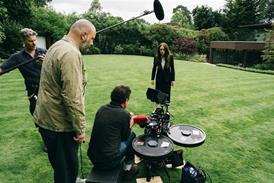Creative Europe’s MEDIA sub-programme is set to come under the responsibility of the Commissioner for Digital Economy and Society to reflect the future role of the digital shift in the development of the creative content industry in Europe.
Until now, the EU’s support programme for the audiovisual industry had been part of the portfolio of the Commissioner for Education & Culture, most recently the Cypriot Androulla Vassiliou.
The European Commission’s President-elect Jean-Claude Juncker has nominated the present Energy Commissioner Günther Oettinger to take on the portfolio of Digital Economy and Society.
In a mission letter to Oettinger, Juncker said that he wanted him ¨to ensure that the right conditions are set, including through copyright law, to support cultural and creative industries and exploit their potential for the economy.¨
Oettinger will be expected to focus, among other things, on preparations for ¨ambitious legislative steps towards a connected Digital Single Market¨ within the first six months and support ¨the development of creative industries and of a successful European media and content industry able to reach out to new audiences, adapt to the digital era and thrive in the connected Digital Single Market.¨
¨We must make better use of the opportunities offered by digital technologies which know no borders,¨ Juncker wrote to Oettinger. ¨To do so, we will need to break down national silos in telecoms regulation, in copyright and data protection legilsation, in the management of radio waves adnd in the application of competition law.¨
¨You should set clear long-term strategic goals to offer legal certainty to the sector and create the rigt regulatory environment to foster investment and innovative businesses. You should also ensure that users are at the centre of your action,¨ he stressed.
Raised eyebrows
According to German press reports, the allocation of this particular portfolio to Oettinger has resulted in raised eyebrows in Berlin: Oettinger was said be ¨not happy, but satisfied¨ at the nomination. He reportedly said that he was ¨motivated and curious¨ about the new position.
However, some regeard the nomination as a slap in the face for Chancellor Angela Merkel who had been expecting Germany to be given a more prestigious post in Juncker’s team such as that of Vice-President or of Trade Commissioner.
Speaking to EurActiv, Green MEP Jan Philipp Albrecht said: ¨the former Energy Commissioner has neither experience in this area, neither does he have a clear agenda over how to tackle digital transformation. This is a disappoinment both for the economy and for consumers.¨
¨Apparently, Juncker doesn’t want a marionette controlled by Merkel and the German lobby to be a leading figure on the negotiations about the Transatlantic Trade and Investment Partnership (TTIP)¨ Green Bundestag deputy Manuel Sarrazin said.
Albrecht was concerned that Oettinger could be given the run-around by such Silicon Valley giants as Amazon and Google since he has little knowledge of how the digital economy operates.
Indeed, a cursory look at the website of Oettinger’s current portfolio for energy issues shows that he has deemed social media to be a low priority with only two tweets having been posted in the last three months before news of his appointment.
Advice from Kroes
This is in stark contrast to Neelie Kroes, the outgoing European Commission vp responsible for the Digital Agenda, who has been a passionate user of social media in all its forms during her tenure (her Twitter account has posted 8,595 tweets and she has over 100,000 followers).
Speaking at the IBC conference in Amsterdam last week a day after Jean-Claude Juncker unveiled his nominations, 73-year-old Kroes offered some advice to the next digital Commissioners:
¨These are not trends we can avoid or ignore. And this is no longer a sector we can afford to constrain.¨
¨Don’t regulate too far or too fast: in some markets – still changing and converging – action would be premature.¨
¨In other areas, like copyright, reform is long overdue. So let’s take every opportunity to deregulate and adapt.¨
¨Most of all – remember where you want to go. Build on your strengths and support them: but look beyond the present. Do not allow the outcome and the opportunity to be determined and defined merely by the status quo.¨
¨The ingredients are in place for positive change – for an audiovisual sector that stays strong, enlightening Europe, leading the world.¨
Resistance to new Culture Commissioner
Meanwhile, the choice of Hungarian Tibor Navracsics as the successor to Androulla Vassiliou for the portfolio of Education, Culture, Multilingualism and Sports has come under fire from various quarters.
According to Brussels insiders, the outgoing Deputy Prime-Minister should expect to be given a thorough grilling by the European Parliament’s Culture and Education committee given that he belongs to the increasingly authoritarian government of Viktor Orban’s Fidesz party.
Speaking on Deutschlandradio, Olaf Zimmermann, managing director of the German Arts Council, called on Juncker to have an urgent rethink on his appointment for the post of Commissioner for Education and Culture.
¨The very man who has been restricting citizens’ rights, who has curtailed press freedom, who has modified the justice apparatus in Hungary to such a degree that one can really ask if this is still following basic democratic rules - he’s the one who’s now supposed to be responsible for these areas in the Commission?¨, Zimmermann asked.
The choice of Navracsics was evidence, he argued, that Juncker didn’t give the area of culture any high priority as this was someone who ¨has made a name for themselves particuarly by wielding the sledgehammer in these areas.¨
In addition to criticism of the choice of Oettinger and Navracsics to oversee the MEDIA and CULTURE sub-programmes of Creative Europe, there has also been irritation expressed that the two areas are now being separated into two different Commissions after having been forcibly merged under the Creative Europe framework programme despite resistance from MEPS in the Culture and Education Committee at the European Parliament, among others.
The European Parliament must give its consent to Juncker’s proposed line-up of Commissioners in a plenary sitting on 20 October after hearings of the Commissioner-designates in the relevant parliamentary committees between September 29 and October 7.
Swiss cash for distribution
Meanwhile, as Brussels discussed the proposed make-up of the future European Commission, Switzerland’s Federal Office for Culture (BAK) announced the results of its first compensatory measures for the Swiss film industry after it was excluded from the EU’s Creative Europe programme following the anti-immigration referendum last February.
The Dardennes’ Deux Jours, Une Nuit, Ken Loach’s Jimmy’s Hall and Uberto Pasolini’s Still Life are among 17 European films which have been awarded selective distribution support totalling over $ 589,000 (CHF 550,000) toward their theatrical releases in Swiss cinemas.
The majority of the titles supported come from France (9), followed by the UK (3), Austria (2) and Italy, Poland, Belgium (1 each).
Zurich-based Filmcoopi received funding for seven releases, ranging from the documentary Amazonia through the Locarno Piazza Grande title Sils Maria and Jimmy’s Hall to Les Combattants and Still Life.
In addition, $ 2m (CHF 1.9m) automatic distribution support, which is calculated according to the number of admissions generated by Swiss distributors for European films in 2013, was paid out to 13 distribution companies, with Pathé Films leading the field with $ 544,792 (CHF 508,607), followed by Filmcoopi Zürich ($ 312,976/CHF 292,189), Elite Film ($ 258,909/CHF 241,713) and Frenetic Films ($ 249,699/CHF 233,114).
As with the MEDIA automatic distribution support scheme, the generated sums must either be reinvested in the co-production of films which are majority produced by companies from MEDIA territories; in minimum guarantees for films from MEDIA territories; or in the promotional costs for foreign films from MEDIA territories.






















No comments yet